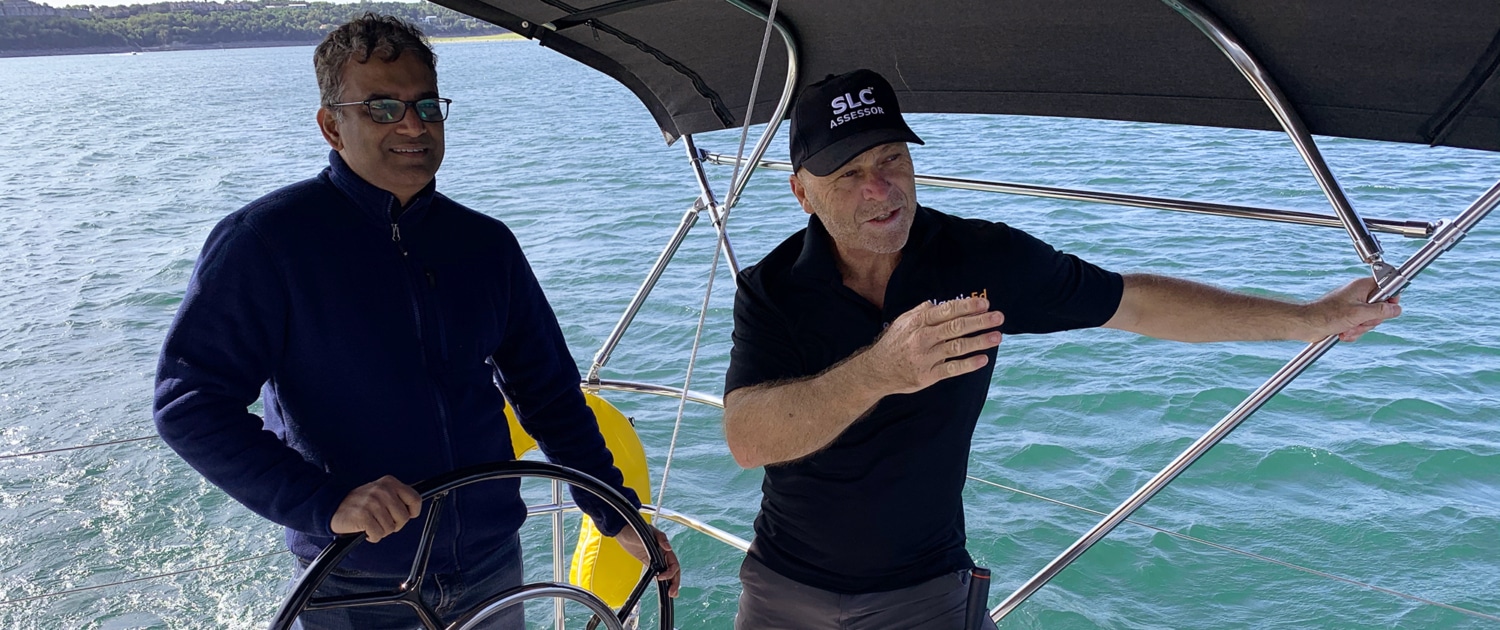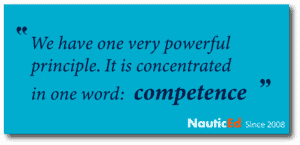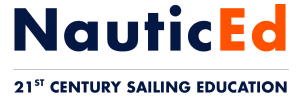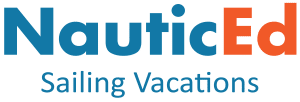Plan your dream yacht charter with NauticEd! Whether you prefer bareboat or captained, NauticEd is your trusted resource for unforgettable sailing vacations. We charge no fees—plus, our expert knowledge and extensive search capabilities often save you money. Start planning your next adventure today!
Sailing Experiential Learning
Setting Sail for Success
At NauticEd, somehow because we offer online courses, some people think that we push that you should only learn to sail online. This is the furthest from the truth. In actual fact, of all the sailing training bodies in the world, NauticEd is the BIGGEST proponent of the notion that EXPERIENCE-combined-with-knowledge is what makes a competent sailor. It is the key reason that we don’t issue certifications without documenting the appropriate amount of experience for each certification (rank).
Sailing is a pursuit that combines both theory and practice in a unique and captivating way. Learning to sail goes beyond bookish knowledge; it additionally requires a hands-on approach. Combining both in what is known as ‘experiential learning’ is key in the context of sailing.
Theoretical Foundation
Before embarking on any journey, it’s essential to have a strong theoretical foundation. In sailing, this includes grasping concepts such as who gives way, understanding wind direction vs sail set, how wind creates lift force, and the physics of sail and hull dynamics. Theoretical knowledge acts as a compass, providing the initial guidance for practical learning.
Sailing Experiential Learning
While theoretical knowledge is crucial, it can only take you so far. Sailing is an intricate dance between the elements and the boat, and the only way to truly understand this is by taking to the water – or more recently taking to a virtual water reality environment. Experiential learning with sailing allows:
- Application of theory. Put your theory knowledge into action. Hands-on experiences reinforce concepts and deepen understanding.
- Problem solving. Sailing is abundant with ever-changing conditions. Experiential learning allows for problem-solving skills when one must adapt and make spot-on decisions.
- Skill development. Repetition through experiential learning builds muscle memory and allows actions to become second nature
- Confidence. As sailors gain competence and independence, they also gain confidence.
- Teamwork and Communication. Sailing often involves ‘working’ as a team. Experiential learning teaches leadership, followership, fellowship, teamwork, and communication.
Experiential learning can be categorized into four stages: Experience, Share, Process, and Generalize.
- Experience. Set sail. Spend time on the water. This is the hands-on part of learning to sail. This is where previously learned theories are put into action.
- Share. Communicate with your instructor; with your crew; and with yourself. Sharing experiences and communicating is vital to learning. Learn from each other and learn from yourself. This enhances the learning experience.
- Process. Reflect. What went well? What could be improved? What could I have done differently? With experience and sharing, this reflection drives improvement and skill refinement.
- Generalize. Apply lessons learned to new situations to adapt and grow. Draw upon experience to tackle new challenges. The ability to generalize skills and knowledge is key to becoming a confident and competent sailor.
Learning from Mistakes
In the world of sailing, making mistakes is inevitable. However, these mistakes are invaluable learning opportunities. Experiential learning encourages sailors to analyze their errors, understand their causes, and develop strategies to avoid repeating them.
Safety
Safety is paramount in sailing, and it is here that the integration of theory and practice shines. Experiential learning, when combined with theoretical knowledge of safety procedures and navigation rules, ensures that sailors are well-prepared to handle emergencies and make informed decisions while on the water.
Those who say “Just get on the water and you’ll figure it out” are putting new sailors in “grave” danger – pun intended. Prior appropriately comprehensive theory knowledge is vital.
Experienced Sailors
The principles of combining theoretical knowledge with experiential learning apply not only to beginners but also to experienced sailors who want to fine-tune and refine their skills. In fact, the process of continuous improvement and skill refinement is essential in sailing.
- Continued theory knowledge. Although experienced sailors may already have a strong theoretical foundation, there’s always more to learn. Learning advanced topics deepens one’s understanding
- Adventure. At NauticEd we say “The more you learn the greater is life’s adventure”. Meaning there is an infinite space for exploration in the sailing knowledge and practical skills ecosphere which ultimately leads to a more exciting and fulfilled life
- Skill Optimization and Mastery. Sailing skills can –and should– be optimized through continuous practice. Experienced sailors can fine-tune their maneuvers, improve their tactics, and become more efficient in handling their vessels. More time on the water leads to refinement of skills. Practicing advanced maneuvers leads to mastery.
- VR. With the addition of virtual reality sailing training, sailors can now work/play to maximize their skills by doing an unlimited amount of real-like practice
Sailing serves as a poignant example of the synergy between theory and experiential learning. While theoretical knowledge sets the stage, experiential learning takes center stage, shaping sailors into confident, capable, and passionate mariners. By understanding the importance of both elements, individuals can embark on a sailing journey that is not only educational but also deeply rewarding. So, hoist the sails, catch the wind, and let experiential learning steer you toward a lifetime of sailing adventures.
How to get Sailing Experiential Learning?
Acknowledging that deep experiential learning is critical, how does one actually go about obtaining such?
NauticEd’s immersive experiential program and philosophy means you can learn and hone your skills on the water over time – at home or on vacation.
First, what is NOT experiential training? Experiential training is not a zero-to-hero course; it is not a program solely focused on achieving a certificate; it is not a ‘credit card’ captain charter; it is not a weekend try-to-learn-everything experience.
What IS experiential training? It is customized and tailored; it is being faced with varied unique and often unpredictable conditions; it is about developing enough knowledge to act, reflect, process, and try again; it helps people realize the vast amount of knowledge needed for sailing; it is about experiencing a broad range of conditions without focusing solely on mastery but rather the experience itself – which leads to mastery.
Because experiential training is customized, first consider your goals. Want to be a better local sailor? Interested in bareboat chartering (now or in the future)? Thinking about retiring and sailing the world?
At home, contact your local NauticEd instructor who is well versed in this philosophy. Also, see here: https://sailing-blog.nauticed.org/nineteen-ways-to-get-sailing-experience-if-you-dont-own-a-boat/. Remember experiential training is not a one-and-done weekend deal; it’s continuous repeated learning in various conditions with different instructors, different friends, different boats, and different waters.
For those who want to bareboat charter, liveaboard, or sail the world, we think one of the best ways to achieve experiential training is to take a charter with an instructional skipper. Set sail with a customized learning and vacation experience. For a week, or 10 days, or more, experience and learn what it is actually like with an American National Standards qualified Instructional Skipper who will guide and tailor the experience for you and your goals.
Talk to your sailing vacation agent or charter company about having a NauticEd Instructional Skipper on your next sailing vacation
Your Adventure - Our Expertise
NauticEd are Yacht Charter Agents
NauticEd is your go-to resource for planning an unforgettable charter vacation, whether bareboat or captained. We don’t charge a fee – actually, we will probably save you money because of our extended search capabilities as well as our knowledge of worldwide locations (i.e., “we’ve been there”). So let us help you plan your next yacht charter vacation!







